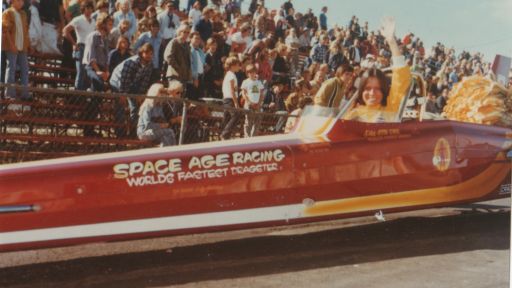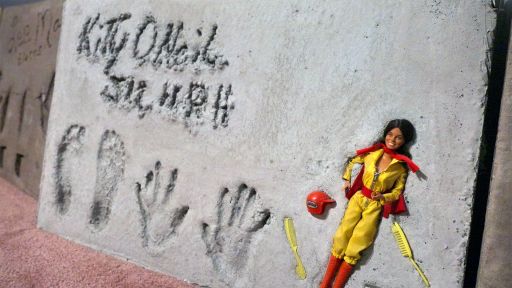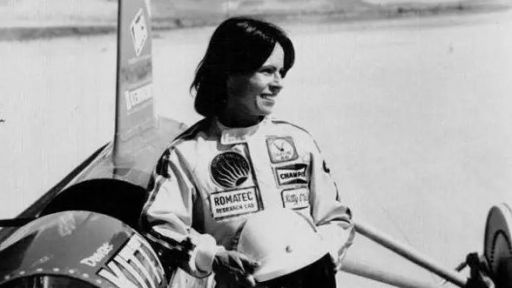TRANSCRIPT
(AUDIO DESCRIPTION + AMERICAN SIGN LANGUAGE)
[Upbeat instrumentals, race car whirring] - [Archive narration] Oh, she's flying!
But she's going too fast to stop!
- [Kitty O'Neil] Wow.
Not fast enough.
- [Lachi] Kitty O'Neil was a daredevil, speed racer, stunt woman, and deaf.
She sounds amazing.
Why doesn't everyone know about her?
One in four Americans today have a disability, and I'm one of them.
Hi, I'm Lachi.
I'm a recording artist, songwriter, [Singing] and disability inclusion advocate.
And this is a show about people with disabilities.
I'm talking about disabled rebels, revolutionaries, renegades, and how they shaped America.
[Clapperboard clacks] [Classic rock instrumentals] Kitty O'Neil is exactly the kind of renegade I wanted to know more about.
So I flew to Minnesota to meet Ky Michaelson, her good friend for more than 40 years.
- [Ky Michaelson] Hey, Lachi!
- Hey.
- Come on in.
- Wow, this is awesome!
- [Lachi] Ky builds rockets and race cars, including the ones that Kitty drove.
- [Lachi] What's this?
- Ah, this is another one of Kitty O'Neil's fire suits.
This is the door.
She ended up crashing this car at 358 miles an hour.
- Nice!
- And she actually walked away from it.
- [Archive narration] The $50,000 car is going to have to be rebuilt, but Kitty is okay!
- Well, you wouldn't want to ride in the car with her.
- [Laughing] Behind the scenes, what was she like?
- Uh, very bouncy, happy-go-lucky.
- [Ky] I think, I knew a person who had no fear.
- And it's kind of unusual.
You don't even think about deaf or disabled people in Hollywood.
And I'm talking now.
Imagine how it was 40, 50 years ago.
- [Lachi] Kitty O'Neil was born on March 24, 1946, in Corpus Christi, Texas.
While still a baby, she contracted several diseases simultaneously, causing a high fever, which destroyed her hearing.
Kitty's mother spent years teaching her how to read lips and discouraged her from using sign language.
- She taught me how to speak: mah, pah, egg, apple, everything.
- [Lachi] Kitty flourished in school, taking up the cello and participating on the swim and diving teams.
In 1962, Kitty and her family moved to California so she could train in platform diving with an Olympic gold medalist.
Unfortunately, she broke her wrist in a diving accident and contracted spinal meningitis.
- I got sick, so I had to start all over again.
And I got bored, so I want to do something fast!
Speed, motorcycle, water skiing, boat, anything.
- [Lachi] She started racing in events like the Baja 500 and the Mint 400, the oldest and most prestigious off-road races in America.
And then, Kitty entered the world of high-stakes stunt work, becoming one of the first women to sign with the leading stunt agency in Hollywood.
How did people see her in the industry, and can you go over some of the things that she did, some of the cool things that Kitty did?
- One of the things she really specialized in doing high falls, because you know, her being a diver, you know-- - Okay.
- She was trying out for the Olympics and stuff.
So she learned how to really handle herself in the air.
But, you know, she did Wonder Woman stuff.
[Landing, crashing] Car stuff, you know, crashing cars, The Blues Brothers, she worked on that big scene when they crashed all the cars.
- She was the type to set herself on fire.
[Laughing] - [Ky] Oh yeah.
- How was the interaction with other folks because of her deafness?
Like how did that factor in?
- In many situations, they didn't notice that she was deaf.
She could read their lips, really read lips well.
- I wonder how that was.
Is that normal to not use sign language and read lips?
I turned to Dr. Rezenet Moges-Riedel, an expert in Deaf culture.
- [Rezenet Moges-Riedel] There was a very negative view of those that did use sign language at that time.
They were seen as savage, and so they really tried to minimize the use of sign and encourage the concept of speaking.
Her parents were not well-informed of what ASL could provide for Kitty, and the access to communication that it would provide.
[Rez] So if a Deaf person chooses to speak, or refuses to do so, yet an oral deaf person chooses to make the best of their ability to speak.
And that was, I think, Kitty, she was able to hold a job because of her ability to speak.
- [Lachi] On December 6th, 1976, Kitty O'Neil became the fastest woman in the world.
Speeding across Oregon's Alvord Desert, she blasted past the women's record by more than 200 miles per hour on her very first run.
Kitty was ready to go even faster.
- [Ky] She ran 512.
And evidently there became a problem with the contract because she was about ready to break the men's record.
- [Lachi] Whoa, so she was pulled from the car because they didn't want a woman to beat the men's record?
- And I thought, oh my God, how unfair is that?
["Two Blown Speakers" by Sean Forbes, instrumental] - [Lachi] What was Hollywood's perception of deafness?
- You know, one of the things that being deaf, you've got total concentration in what you're doing.
- Yeah.
- Cause when you're doing, uh, death-defying stunts, you have to be right on because things can go bad really quick if you lose your concentration.
Because of her deafness, it was one of the reasons I really think that Hollywood loved her right off the bat.
- The only thing I'm afraid of is mice, spiders.
Just overcome fear.
I'm not afraid of anything.
Just do it.
- [Ky] But thank God she never got killed doing stunt work.
- Right, yes.
- That was our biggest fear, working with her.
- Because the stunts were just so... - [Lachi] Insane.
- [Ky] Dangerous.
- [Man off-camera] She's alright.
- [Woman off-camera] She's okay.
- [Archive narration] Kitty is alright!
- [Man off-camera] Let's get her eyes flushed out.
- [Kitty] I had a lot of fun!
- [Ky] So we get down there, and she's already out of the car, which I couldn't believe, and the first thing is you know, I love this!
I want to roll over cars!
And I'm going Oh, Kitty, you just destroyed the car.
- [Man] Ah, God, at least she's alright.
- [Ky] Alright, you're going to enjoy what's out here.
- Wow.
- And I think the most precious thing to me amongst these cars is the one that Kitty O'Neil drove.
- Okay.
- Back in the the seventies.
- Yeah.
- [Ky] And she set a number-- - [Lachi] Oh, nice!
- [Ky] Of acceleration world records in this car.
- Can I get in?
- Sure.
- Are you serious?
- Yeah, why not?
- [Lachi, strained] Ugh, I am too tall for this car!
- Yeah you're too tall, you are too tall for this car.
- I am never getting out of this car!
[Laughing] Wow, so I am in the car where Kitty broke acceleration records, and I'm just sitting in it.
This is so awesome!
- We probably don't give her as much credit as we should because maybe she doesn't reflect all of the deaf signing community.
I really think she is an unsung hero of that time.
She didn't have the privilege that we have today, and she was doing her best with what she had, and she was able to figure out how to communicate and how to access jobs.
- Now, I heard of this concept called Deaf Gain.
Can you tell me what this is and a little more about it?
- This was early 2000 to 2010.
There was a lot of medical intervention of genetic design eliminating the Deaf genes, modifying genes.
And that was really a scary time for the Deaf community.
They felt like, questioning their existence, 'Does that mean that I shouldn't be alive?'
And so, there was this concept of Deaf Gain that was pushing academics to reframe how deaf people contribute to society as a result of their deafness.
And that Deaf Gain is to bring biodiversity, how they greatly contribute to society at large.
I really try to change the idea of hearing loss.
I don't use those words, "hearing loss."
We didn't lose.
- [Lachi] Language is so important in how we frame things.
I really loved what Dr. Rezenet said, The opposite of hearing loss is Deaf Gain.
It's a powerful thing to declare: This is who I am and no part of me is lost or diminished.
Kitty passed away November 2nd, 2018.
I wish I could have met her.
I love how passionate she was about her racing and breaking speed records.
She even has her own Barbie doll!
I love this.
- Thrilling, thrill.
Feels good, the speed.
It gives me goosebumps.
I love it!
["Two Blown Speakers" instrumentals continue]



